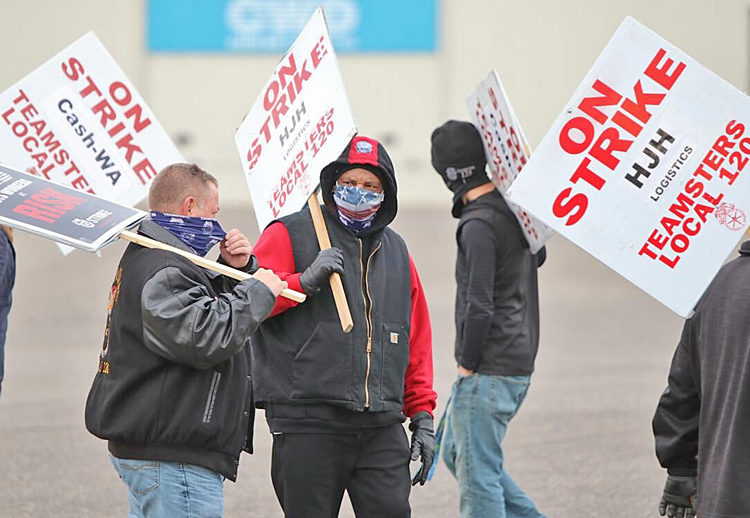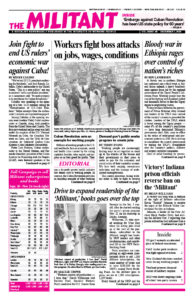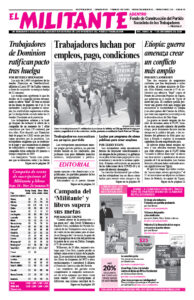Working people are increasingly finding ways to act together to stand up to the attacks of the bosses and their government as they press to make us pay for the economic and social crisis of their capitalist system. We face both surging coronavirus infections and the scourge of widespread unemployment.
The central questions facing workers today is how to fight to reverse these assaults, and the effects of the way the capitalist rulers respond — with lockdowns on production, trade and all aspects of small business. Workers need to be on the job, alongside their fellow workers, to discuss and decide how best to act together and win allies.
It’s why the Socialist Workers Party says workers need to organize and fight for a government-funded public works program to create jobs to put millions back to work at union-scale wages building hospitals, schools, and housing.
As workers resist they set an example for others, showing that through struggles we wage at work, we can win victories, unite in solidarity with others and build and strengthen a union movement of millions.
Nurses and other medical workers are increasingly going on strike to demand more staffing and higher pay. They struck at St. Mary Medical Center in Langhorne, Pennsylvania, Nov. 17-18, over these issues. At Unitex Corporation in Perth Amboy, New Jersey, one of the largest hospital laundry and medical uniform companies in the New York metropolitan area, workers walked out Nov. 18-19 over threats to fire union members.
Some 700 nursing home workers — members of the SEIU Health Care Illinois Union — went on strike Nov. 23 at 11 Infinity elderly care facilities in the Chicago area. They are demanding reinstitution of pandemic hazard pay and improved working conditions in facilities that have some of the highest coronavirus cases in the state. Infinity bosses stopped the extra pay in July.
Workers in other industries are fighting back. In Fargo, North Dakota, 70 workers, members of Teamsters Local 120, struck the Cash-Wa food distribution center Nov. 18. They are protesting the company’s refusal to provide safe working conditions to limit the spread of the virus and are demanding bosses negotiate a new contract with the union.
As a “second wave” of coronavirus is surging, hospitals that did little to prepare for this are overflowing, and medicines and protective equipment are scarce. The only thing city and state governments are doing is reimposing shutdowns on restaurants, gyms, and other services and telling people to stay in their homes. The government reported nearly three-quarters of a million new applicants for unemployment for the week ending Nov. 14.

Despite the high death toll from virus infections in meatpacking plants earlier this year, federal guidelines advise bosses that they only have to keep workers in these factories six feet apart “if possible.” So bosses continue packing them in closely together in order to run production lines as fast as possible.
Work can be carried out safely, but only if workers and our unions wage a fight to wrest control of production from the bosses, including line speeds and all other aspects of health and safety.
The disdain of the bosses for workers’ lives was exposed by a lawsuit filed against the Tyson pork plant in Waterloo, Iowa, by the son of Isidro Fernandez, a worker there who died of COVID-19 in April. While some 1,000 workers got the disease — which the bosses tried to deny at the time — management started a “winner take all” pool for whichever supervisor guessed closest to the number who got sick.
Seizing on the fact that workers face rising competition for jobs, bosses are telling workers and their unions to “trade” wage cuts to keep their jobs. Construction bosses at L+M in New York announced a deal Nov. 19 with officials from Laborers Union Local 79 that cuts wages by 35% for union members on four new construction projects.
The SWP calls for unions to fight for a cut in the workweek with no cut in pay to prevent layoffs and protect workers’ incomes.
The federal government reported Nov. 18 that some of the largest and most profitable companies in the country are also those whose low wage levels force workers to apply for food stamps and other assistance to get by. Walmart, for instance, was one of the top four employers of workers on food stamps and Medicaid in all 50 states.
As hospitals in some parts of the country reach full capacity, the horrific consequences of the for-profit health industry for the working class becomes ever more apparent.
Nurses and doctors in rural areas in Kansas spend up to eight hours before they can find a bed to send patients to — as far away as Kansas City, Denver or Omaha. “By the time you transfer these patients out they already are very ill,” nurse Perry Desbien told the press.
With deaths mounting in El Paso, Texas, bosses at morgues in the city are protecting their bottom line by hiring prison inmates at $2 an hour to stack corpses in refrigerated trucks.
For-profit hospitals, nursing homes
Nowhere is the capitalist rulers’ immoral indifference to the lives of working people more evident than in the conditions hundreds of thousands of elderly face today in nursing homes. Crammed into overcrowded and understaffed facilities, more than 97,000 long-term care residents have died from COVID-19, so far.
But the numbers dying in nursing homes from other causes — neglect and lack of adequate care — has also risen in recent months. Governments and the bosses barred residents from receiving any visitors, including family. This meant they didn’t get help with feeding, bathing and dressing, care that the bosses take into account in setting staffing levels. Residents were subjected to periods of prolonged isolation.
Instead of admitting that these are the real factors in many deaths of those who didn’t catch coronavirus in elderly care, death certificates have started listing the cause as “failure to thrive”!
When workers get older, and the bosses can no longer profit off their labor, the capitalist class no longer cares if they live or die.
The Socialist Workers Party says the greatest problem facing the working class is that we have no political instrument of our own that we can use to discuss, debate and, above all, to act on the crisis we face. We need our own political party, a labor party.


